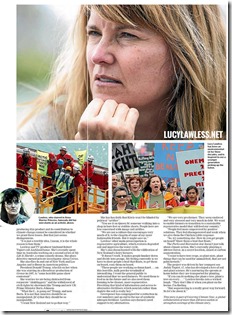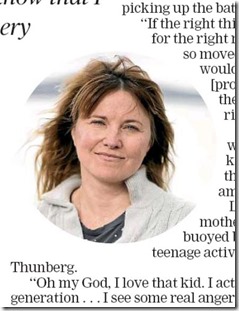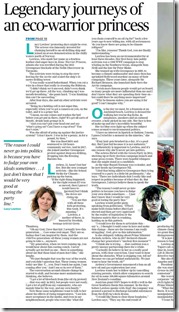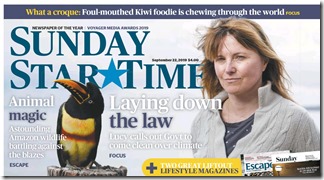Lucy is interviewed in the Sunday Star Times (NZ) 22 September 2019
Lucy Lawless tells Andrea Vance why she’s in awe of young protesters and calls on Jacinda Ardern to come clean on her struggles to fight climate change.
Lucy Lawless’ protesting days might be over. The actress was famously arrested for chaining herself to an oil drilling ship and joined an at-sea demonstration in the chilly waters north of Norway. Lawless, who made her name as a fearless leather-clad super-hero in Xena: Warrior Princess, admits she was terrified during the 2012 Greenpeace blockade of the Noble Discoverer in Taranaki.
The activists were trying to stop the crew leaving for the Arctic and scaled the ship’s 53 metre drilling tower.
‘‘I was really scared beforehand. When you cut a wire in a fence that really is crossing the Rubicon.
‘‘I didn’t think we’d succeed, didn’t even think we’d get up there. All the way, climbing up I was mouth-breathing,’’ she pants hard. ‘‘I was thinking: this can’t be succeeding.’’
After four days, she and six other activists were arrested.
‘‘Being in a holding cell is not super-fun, especially when you’ve got a camera on you, on the toilet, and it is a grimy bed.
‘‘I mean, no-one comes and washes the bed before you get put in there, right? It’s got all sorts of bloody, drunk tank grunge in it.
‘‘And you can’t put your head out and say ‘what’s going on? Can I have a cup of tea?’ You don’t exist.’’
Was she afraid of going up against the justice system? ‘‘I don’t know. I was in for a penny, in for a pound, by then.’’
She was fined $651 and sentenced to 120 hours community service. And in 2017, she joined another Greenpeace protest against deep-sea drilling, dropping into the freezing Barents Sea.
Lawless, 51, hasn’t lost her fire. But she sees younger activists – like the School Strike for Climate – picking up the baton. ‘‘If the right thing happened, for the right reason if I was so moved, then I guess I would have to [protest] but I think the doves are rising up. ‘‘You see this with all these kids protesting, this week. It’s amazing.’’ Lawless, a mother of three, is buoyed by Swedish, teenage activist Greta
Thunberg.
‘‘Oh my God, I love that kid. I actually love this generation . . . I see some real anger. They are so badass that I am inspired by them. And the #MeToo generation: all these young women are not going to take s... anymore.
‘‘My generation, when we were coming up, you would hear about this casting couch. I never actually got invited on one – there is something about me that those kind of men don’t like,’’ she laughs.
‘‘We just thought that was the way of the world, and you didn’t question that. These young women today are like: ‘f .... you. Don’t touch me again, I am coming after you.’ And I am so in awe of them.’’
The conversation around climate change has started to shift, and become more mainstream thinking, she believes.
‘‘I got a lot of blowback from [the oil rig protest] . . . that was only in 2012, but people were not ready. I got a lot of guff from my community, who are mainly blue by the way, and my own family.’’
Now those same neighbours want to talk to her about the effects of rising temperatures. ‘‘I see lots more acceptance in the media, and even in my neighbourhood, people who were like ‘what did you chain yourself to an oil rig for?’ back a few years ago to now telling me, with all seriousness: ‘do you know there are going to be climate refugees?’
‘‘I’m like, yessssss! Thank God, you are finally understanding.’’
Lawless has been an environmentalist for at least three decades. Her first foray into public activism was a 1998 WWF campaign to stop whaling in the Southern Ocean, alongside Sam Neill and the late Sir Peter Blake.
She teamed up with Greenpeace in 2009, to become a climate ambassador and since then has sprinkled Hollywood stardust on many of their campaigns. Three years later, alongside Sir Richard Branson, she launched their Save the Arctic campaign.
‘‘I wish more famous people would get on board, so many people are more influential than me and I don’t know what they are spending their time on – but could there be anything more important?
‘‘Why be famous unless you are using it for good? I can’t imagine why.’’
On the day we meet, by a fountain at an Auckland beach, Lawless is dressed for walking her rescue dog Koha, in sunglasses, sneakers and an oatmeal sweater, a hole picked in one side. Her face is free of make-up and she’s incredibly beautiful.
Her ice-blue eyes light up when the subject comes around to environmental politics.
‘‘I have no interest in lipstick or fashion. I mean, I guess I tried for a moment in the nineties,’’ she says.
‘‘If my hair gets brushed in a day, it’s a good day. But I just fail because it is not authentic.’’
Authenticity is important to Lawless, and it’s one reason why she’ll never get into politics.
The actress flirted with the Green Party in 2014, showing up at their election campaign launch and some press events. There were hopeful whispers that she might stand as a candidate.
At the time Russel Norman was co-leader, and he now heads up Greenpeace NZ.
‘‘I feel that being allied to Greenpeace then tying yourself to a party is a little bit problematic,’’ she says. ‘‘There are individuals that I really like and respect in politics because of what they do. But Greenpeace, I always believe them to speak the truth.
‘‘The reason I could never go into politics is because you have to fudge your own ideals sometimes . . . I just don’t know that I would be very good at toeing the party line.’’
Lawless would prefer plain speaking from politicians. ‘‘[They] make bold claims before [they] get elected and then get very oppressed by the reality of legislation or the business matrix that is crushing, holding us in this pattern.
‘‘I would love for them to articulate this – say ‘s... I thought I could come in here and make this change – these are the reasons I am really struggling’. God, give us this information.’’
Is she obliquely talking about Prime Minister Jacinda Ardern, who in 2017 declared climate change her generation’s ‘‘nuclear-free moment’’?
‘‘I think she is trying . . . that coalition was a pretty uneasy partnership there for a while.
‘‘I actually do believe in her as a really good person, with clear conviction. I just want to hear about the obstacles. What is stopping you, tell us? Because we can get behind authenticity. We just want to hear the truth, eh?’’
Ardern’s Government announced a ban on all new oil and gas exploration last year.
Lawless wants her to follow up by cancelling existing permits, which allow companies to search for oil in some 100,000 square kilometres around New Zealand’s coastline.
Austrian giant OMV hopes to drill a well in the Great Southern Basin this summer. In the days before Lawless speaks with Stuff, the company was granted a permit to discharge harmful substances from the drill rig’s deck drains.
‘‘I would like them to close those loopholes,’’ Lawless says. ‘‘They say the end result of
producing this product and its contribution to climate change cannot be considered in whether we grant these leases. But that just seems disingenuous.
‘‘It is just a terrible idea, I mean, it is the whole reason to ban them.’’
Lawless and TV producer husband Robert Tapert call Auckland home. She’s recently spent time in Australia working on a second series of My Life Is Murder, a crime comedy-drama. She plays detective turned private investigator Alexa Crowe.
She also flies in and out of New York and Los Angeles and is fluent in American politics.
President Donald Trump, who hit on her when she was starring in a Broadway production of Grease in 1997, is ‘‘some horrible game show contestant’’.
She worries we are being distracted from corporate ‘‘skulduggery’’ and the withdrawal of civil rights by showmen like Trump and new UK Prime Minister Boris Johnson.
‘‘What the f... is going on? Trump, and now Boris. It is not that America should be so manipulated, [it’s] that they should be so manipulable.
‘‘I want New Zealand not to go that way.’’
She has has faith that Kiwis won’t be blinded by political ‘‘artifice’’.
‘‘You see it on Queen St: someone walking into a shop in bare feet or stubbie shorts. People here are less concerned with image and artifice.
‘‘We are not a culture that encourages very much of it, to the chagrin of some of my more fashionable friends. But it might save us.’’
Lawless’ other main preoccupation is regenerative agriculture, which restores degraded soil and improves the water cycle.
She’s also disenchanted with the vilification of New Zealand’s dairy farmers.
‘‘It doesn’t work. It makes people hunker down and divide into groups. My feeling currently is we have to show people a boat that floats, to get them on board, coax them on board.
‘‘These people are working so damn hard . . . on this horrible, milk powder treadmill of intensifying. I want the general public to understand that we need farmers. We need them to feed us in the future and we also need them farming to be cleaner, more regenerative. Providing that kind of information and access to alternative fertilisers which nourish rather than deplete the soil is really key.’’
Greenpeace has campaigned for a reduction in cow numbers and an end to the use of synthetic nitrogen fertiliser. Lawless says farmers need support to try alternatives.
‘‘We are very pro-farmer. They seem enslaved and very stressed and very much in debt. We want to enable farmers to transition to a sustainable regenerative model that will feed our country.’’
‘‘People feel more empowered by positive solutions. They feel disempowered and weak when we give them the Chicken Little response.
‘‘So, try something else. How do you get people on board? Show them a boat that floats.’’
The Parks and Recreation star doesn’t just talk about climate action. She’s currently planting a 400-tree forest, in a secret location, aimed at carbon sequestration.
‘‘I want to have tree crops, so plant nuts, plant things that can be used for animal feed, that are not palm kernels.’’
The project was driven by her youngest son Judah Tapert, 17, who has developed a love of soil and plant science. He’s nurturing the sprouts at home before they are transported for planting.
‘‘If you can do nothing else plant a tree, plant a tree on every . . .’’ Lawless breaks into a wicked laugh. ‘‘They don’t like it when you plant on the berms, I’m finding.
‘‘But sequestering is a really great way forward. So let’s be about it.’’



